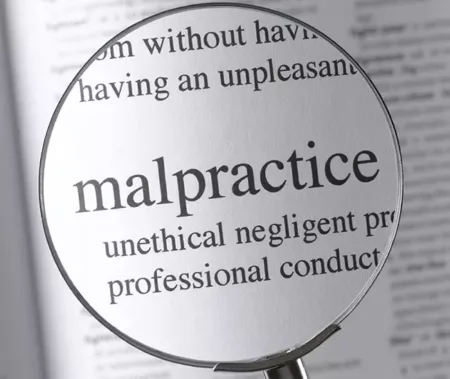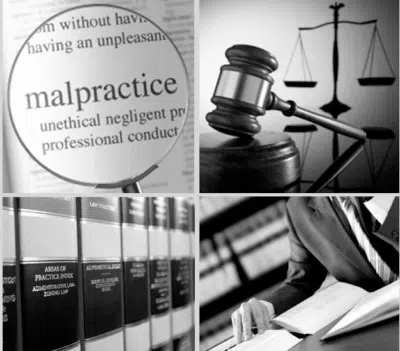
A lawyer’s failure to know or apply the law can amount to legal malpractice when the lawyer’s failure is either procedural or substantive. A failure to know or apply procedural law is based on how a lawyer should pursue the client’s claim. A lawyer’s failure to know or apply substantive law—the specific legal criteria for establishing or defending a particular claim—is based on what claims or defenses the lawyer presents, with reference to both the facts of the client’s case and the law.
In many cases, a lawyer’s failure to know or apply substantive law is accompanied by one or a number of failures to apply procedural law—missing deadlines; filing motions that have no legal validity rather than a proper appeal that might succeed; and many other lapses.
What failures to know or apply procedural law may constitute legal malpractice?
The most obvious procedural errors that may support a legal malpractice claim involve the lawyer’s failure to file necessary papers within the specific time required by rule or statute, or the lawyer’s failure to file documents within the time necessary to protect the client’s interests, even if there is no deadline:
- Failure to know which statute of limitations (the time within which a particular claim must be filed or forfeited) applies to a client’s claim.
- Failure to know when an appeal must be filed, after which the appellate court cannot consider the appeal.
- Failure to know when other papers, such as oil and gas leases, mechanic’s liens, or bankruptcy petitions, must be filed in order to protect the client’s interests, even if there is no explicit deadline.
Other procedural errors may also give rise to a legal malpractice claim, such as a lawyer’s failure to attach required documents to complaints, answers, or motions; or a failure to subpoena necessary witnesses. To proficiently handle a client’s case, a lawyer must be knowledgeable about both the substantive law and the procedural requirements necessary to properly present the case.
What failures to know or apply the substantive law may result in a legal malpractice claim?
There are probably as many potential failures to know or apply substantive law as there are substantive legal issues. Our substantive law is constantly evolving. Statutes are enacted, modified, and repealed legislatively; a statute’s meaning may be altered or the statute declared void as a result of judicial interpretation. Common law, as defined in court decisions, also changes to reflect our changing reality, attitudes, and politics. To avoid malpractice, a competent lawyer must constantly keep abreast of changes in the law, updating research regularly—even in areas in which the lawyer is experienced.
Knowing whether your former lawyer was unaware or unable to properly apply the law in your case is essential to success in a legal malpractice case against that lawyer. One of the most important decisions you will have to make is choosing a law firm with proven results in handling both legal malpractice cases and a broad range of cases involving legal principles similar to those in your underlying case.
Here are some examples of lawyers’ failure to know or properly apply the substantive law in their clients’ cases:
Failure to recognize a significant defense in a client’s case.
In a recent Ohio case, when the client’s girlfriend moved out of the home they shared, she sued him to recover payment for her interest in the home. His lawyer failed to introduce any evidence of the outstanding mortgage debt that materially reduced the couple’s equity in the home. Taking the mortgage into account would have saved the client $40,000 in the amount awarded to the girlfriend to cover her interest. The lawyer also failed to file a counterclaim for the value of jointly held vehicles that the girlfriend retained when she moved out. In addition, the lawyer failed to utilize procedures that might have improved the client’s likelihood of success: he failed to file motions that might have terminated the girlfriend’s case, failed to conduct discovery (deposition testimony, written questions, and requests for documents concerning her claims), did not prepare the client for trial, submitted no exhibits, and failed to make a closing argument after the trial. Not surprisingly, the court stated that malpractice was “obvious.”
Failure to know and include necessary language when drafting a legal document, such as a will, trust, or contract.
In another case, the lawyer drafted a trust for his client, allocating the client’s assets to her chosen beneficiaries. The client had created and abandoned several previous trusts. The lawyer who drafted the final trust before the client’s death failed to include the language necessary to revoke previous trusts so that the client’s assets could be distributed to the beneficiaries in accordance with the terms of the final trust document. One intended beneficiary lost 10% of what she would have received if the trust had been drafted properly.
Unfortunately, the beneficiary of a will or trust is not the client of the lawyer preparing the document—the person making the will or trust is the client. In this case, the beneficiary could not recover from the lawyer’s malpractice because he was not her lawyer.
Failure to understand or properly explain to the client the legal effect of a provision in the client’s divorce decree.
The client hired a divorce lawyer to represent her. The lawyer prepared a divorce decree, which the client and her husband both signed, and the divorce court ultimately approved. The lawyer believed, and told the client, that she would receive a lump sum payment for her share of her husband’s retirement benefits. The client would not have signed the divorce decree without the lump sum payment provision. When the husband later refused to cooperate concerning the retirement benefits, the client learned that her divorce decree did not entitle her to the lump sum she expected to receive. Her only recourse was a malpractice claim.
In another divorce case, the lawyer advised his client to sign an agreed judgment entry under which the client could not modify his spousal support obligation. The client could not afford the $8,000/month he agreed to pay. In the divorce case, the client told the judge that he understood and agreed to the judgment entry. When he later sued the lawyer for giving him bad advice, the lawyer argued that the malpractice claim was barred because it was inconsistent with the client’s statements in the divorce court. The malpractice court rejected the lawyer’s defense. If the client’s malpractice claim were barred based on the client’s prior statement that he understood and agreed to the judgment entry—a statement based on the lawyer’s bad advice—no attorney giving bad advice in a similar case could ever be held responsible for malpractice.
Ignorance of the need to file an appeal even if another party has appealed.
The client was denied three years of disability benefits because his lawyer failed to appeal a hearing officer’s decision. The lawyer mistakenly believed that because his client’s employer appealed the hearing officer’s decision, his client did not need to appeal. The lawyer wrongly assumed that one party’s appeal opens up all issues for review to all parties. In fact, a party who doesn’t file a notice of appeal cannot oppose the final judgment on appeal, attack it to expand his own rights, or diminish the rights of his adversary, even if his adversary has filed an appeal.
The mistaken belief that a minor cannot be held liable for causing a motor vehicle accident.
A lawyer who had been practicing law for only a year agreed to represent a mother and daughter in a personal injury case arising from an auto accident. The clients were injured as a result of the actions of two other vehicles’ drivers. The lawyer sued the driver of one vehicle, which had been pushed into the clients’ lane by a second vehicle, and the father of the minor driving the second vehicle. He did not sue the minor who was primarily at fault because he did not believe that a minor could be held legally responsible for the client’s injuries.
Rely on a Full-Service Firm to Handle Your Legal Malpractice Case
The consequences of a lawyer’s failure to know or properly apply the law can be severe. Not only can you suffer a financial loss, but you may have to wait a year or more before you receive compensation from the lawyer who failed to represent you properly. If you believe you have a case against a former lawyer, you should reach out to an experienced, full-service law firm with expertise in a wide range of legal practice areas such as legal malpractice, and a proven track record of success.
Like so many others who have placed their trust in us, you can count on Slater & Zurz LLP to thoroughly evaluate your legal malpractice claim, answer your questions, and advise you concerning whether you should proceed. Call or email our team of motivated, determined professionals for a free consultation. We’re here to serve your legal needs with unwavering dedication and the drive to win.




